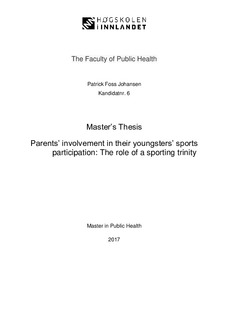Parents’ involvement in their youngsters’ sports participation: The role of a sporting trinity
Master thesis
Permanent lenke
http://hdl.handle.net/11250/2456963Utgivelsesdato
2017Metadata
Vis full innførselSammendrag
Background: Sports, in form of organized and unorganized physical activity, is an important pastime for Norwegian youth and trends in participation is increasing in terms of rates and frequencies. At the same time, there is increasing evidence that childhood is a crucial stage of life for forming predispositions for lifelong participation in sports, while parents have been demonstrated to be increasingly invested in the ‘concerted cultivation’ of their youngsters’ sporting habits. Seeing as sports holds several physical and psychological benefits, it is surprising then, that parents’ involvement in their youngsters’ sporting lives have received so little attention in a Norwegian context.
Theory: The theory used to inform this research is existing research and literature on the domain of parenting, socialisation and youth sports and Bourdieu’s theory of ‘Distinction’ with emphasis on cultural capital and habitus in addition to the Omnivore/Univore thesis by Peterson.
Methods and aim: Through a qualitative case study design of a combined primary- and secondary school in a small/mid-sized Norwegian city, the purpose was to expand the understanding of parental involvement in an area relatively scarcely studied in Norway.
Results and conclusion: It was evident among the sample here that parents only play one (albeit very important) part in the formation of their youngsters’ sporting habits. Along with the strong sporting culture and the sporting clubs, the parents formed something akin to a ‘sporting trinity’ that strengthened children’s sporting predispositions, providing foundations for further sports participation for years to come. These findings may have implications for policy-makers looking towards Norway for the ‘recipe’ for sports participation.
Beskrivelse
Master i folkehelsevitenskap med vekt på endringer av livsstilsvaner, 2017
